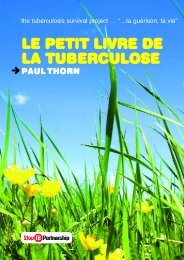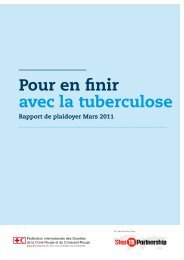Thailand - Stop TB Partnership
Thailand - Stop TB Partnership
Thailand - Stop TB Partnership
Create successful ePaper yourself
Turn your PDF publications into a flip-book with our unique Google optimized e-Paper software.
among people living with HIV/AIDS. 71 The interaction between <strong>TB</strong> drugs and ARVs is not<br />
well understood among health practitioners, and the National AIDS Control Programme<br />
is not always well equipped to cope with the needs of people living with HIV/AIDS who<br />
become ill with <strong>TB</strong>. 72 Finally, people with HIV may be more likely to delay seeking <strong>TB</strong><br />
treatment, 73 underscoring the importance of outreach and active <strong>TB</strong> case-finding services at<br />
HIV/AIDS treatment centers.<br />
Some <strong>TB</strong> experts have asserted that the integration of <strong>TB</strong> and HIV/AIDS programs<br />
happened too quickly, resulting in the dominance of the National AIDS Control Programme<br />
over the NTP and the downgrading of <strong>TB</strong> services. For example, the director of one zonal<br />
<strong>TB</strong> center has insisted that both programs must be independently effective for integration<br />
to be mutually beneficial. In his view, an effective <strong>TB</strong> policy requires the employment of<br />
specialized <strong>TB</strong> staff, and a “second health reform” is needed to reinstate an independent <strong>TB</strong><br />
division to prepare for more effective integration of services at the field level. 74<br />
For community-based groups and NGOs that work at the field level, the integration<br />
of services may seem logical because patients with both diseases have a clear continuum of<br />
needs. 75 The NTP and National AIDS Control Programme should reexamine the infrastructure<br />
of integration to ensure that proper support is provided to public health clinics and<br />
HIV/AIDS community organizations for addition of <strong>TB</strong> care to their existing line of services<br />
and to <strong>TB</strong> clinics for HIV counseling, testing, and referral services.<br />
Isoniazid preventive therapy<br />
One recent research study conducted in the northern provinces confirmed that isoniazid<br />
preventive therapy (IPT) provides significant protection against <strong>TB</strong> infection among people<br />
living with HIV/AIDS. Of the 412 people living with HIV/AIDS enrolled in the study, 50.5<br />
percent persisted with IPT for nine months and showed no signs or symptoms of active <strong>TB</strong><br />
based on physical examination, chest radiography, and sputum examination; 12.9 percent<br />
died; 33 percent defaulted; 2.2 percent developed active <strong>TB</strong> and dropped out; 0.5 percent<br />
developed hepatitis; and 1 percent migrated to other provinces. 76<br />
Health care providers, however, are still debating the efficacy of IPT. Some point out<br />
that the effectiveness of IPT may wear off in about two years, 77 and express concerns about<br />
drug toxicity and resistance developing as a result of prolonged IPT treatment. Because of<br />
these concerns, and in the absence of clear national policy guidelines, many Thai physicians<br />
do not recommend IPT, and Thai health clinics do not offer it systematically. 78 The NTP and<br />
National AIDS Control Programme should consider developing national guidelines and<br />
training on when and how to use IPT treatment.<br />
50<br />
<strong>TB</strong> POLICY IN THAILAND



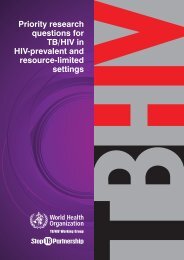
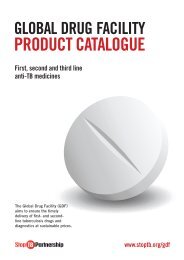
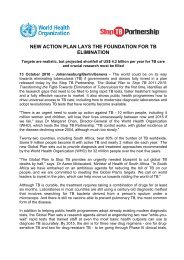
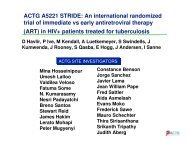
![Global Drug Facility Annual Report 2011 [.pdf] - Stop TB Partnership](https://img.yumpu.com/26788745/1/184x260/global-drug-facility-annual-report-2011-pdf-stop-tb-partnership.jpg?quality=85)

![Concept note on national stop TB partnership [.pdf]](https://img.yumpu.com/26788741/1/184x260/concept-note-on-national-stop-tb-partnership-pdf.jpg?quality=85)
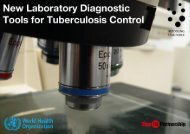
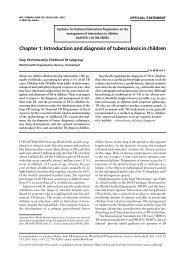
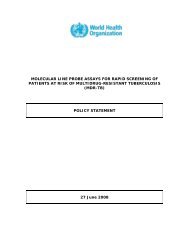
![2005 and Challenges for 2006 - 2015 [.pdf] - Stop TB Partnership](https://img.yumpu.com/26788674/1/190x245/2005-and-challenges-for-2006-2015-pdf-stop-tb-partnership.jpg?quality=85)
![Brochure (French) [.pdf] - Stop TB Partnership](https://img.yumpu.com/17234792/1/190x91/brochure-french-pdf-stop-tb-partnership.jpg?quality=85)
